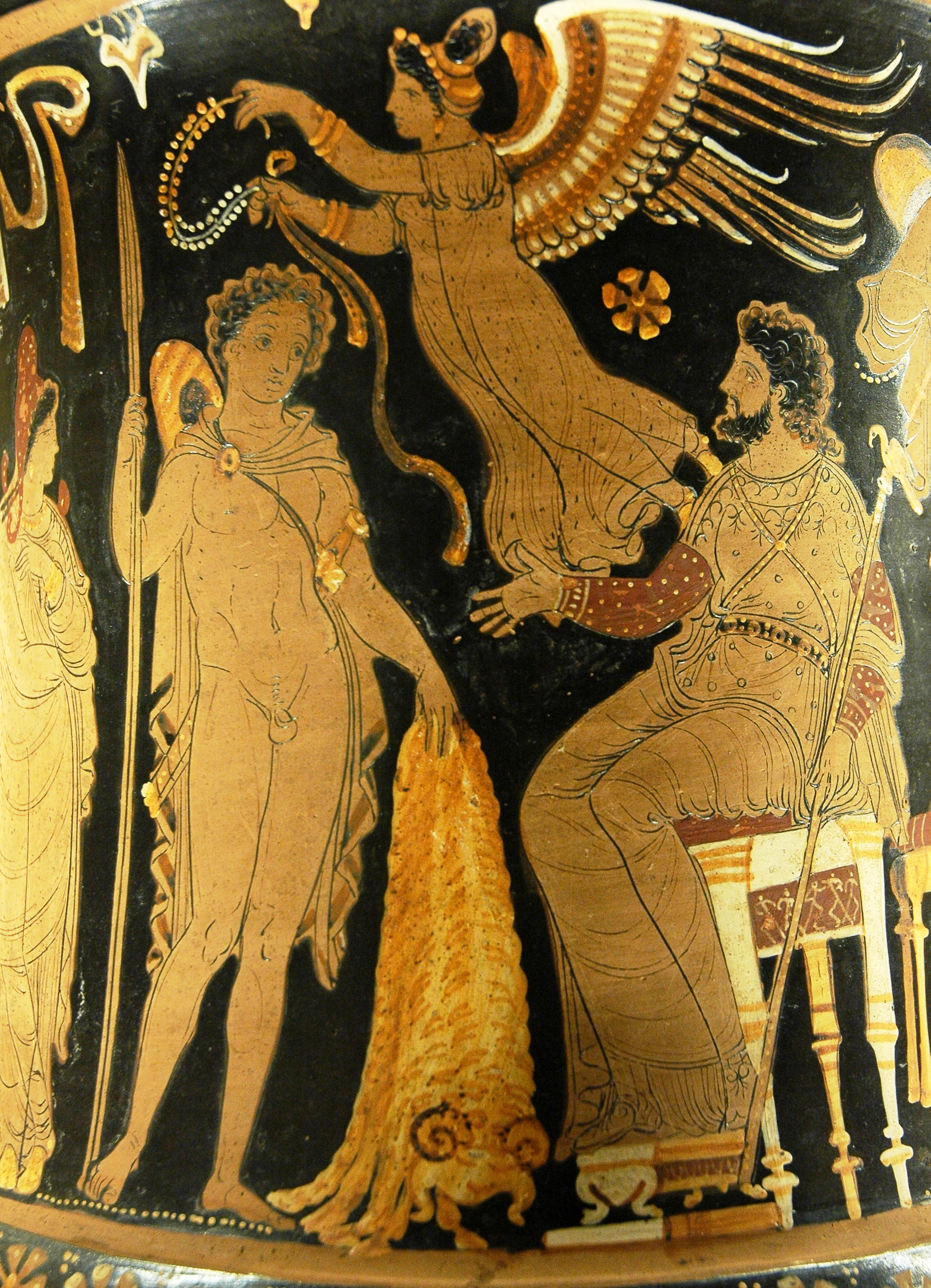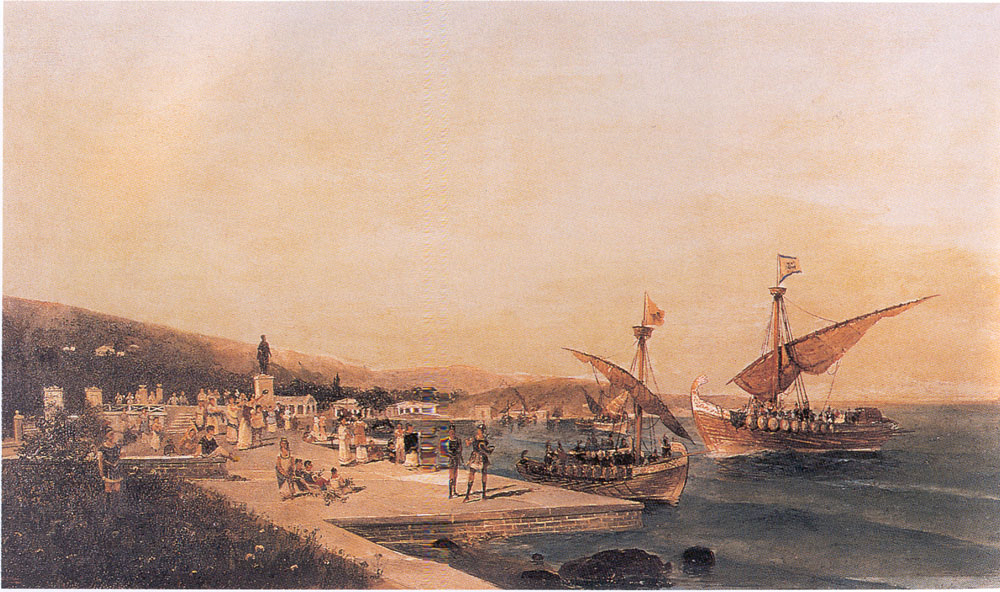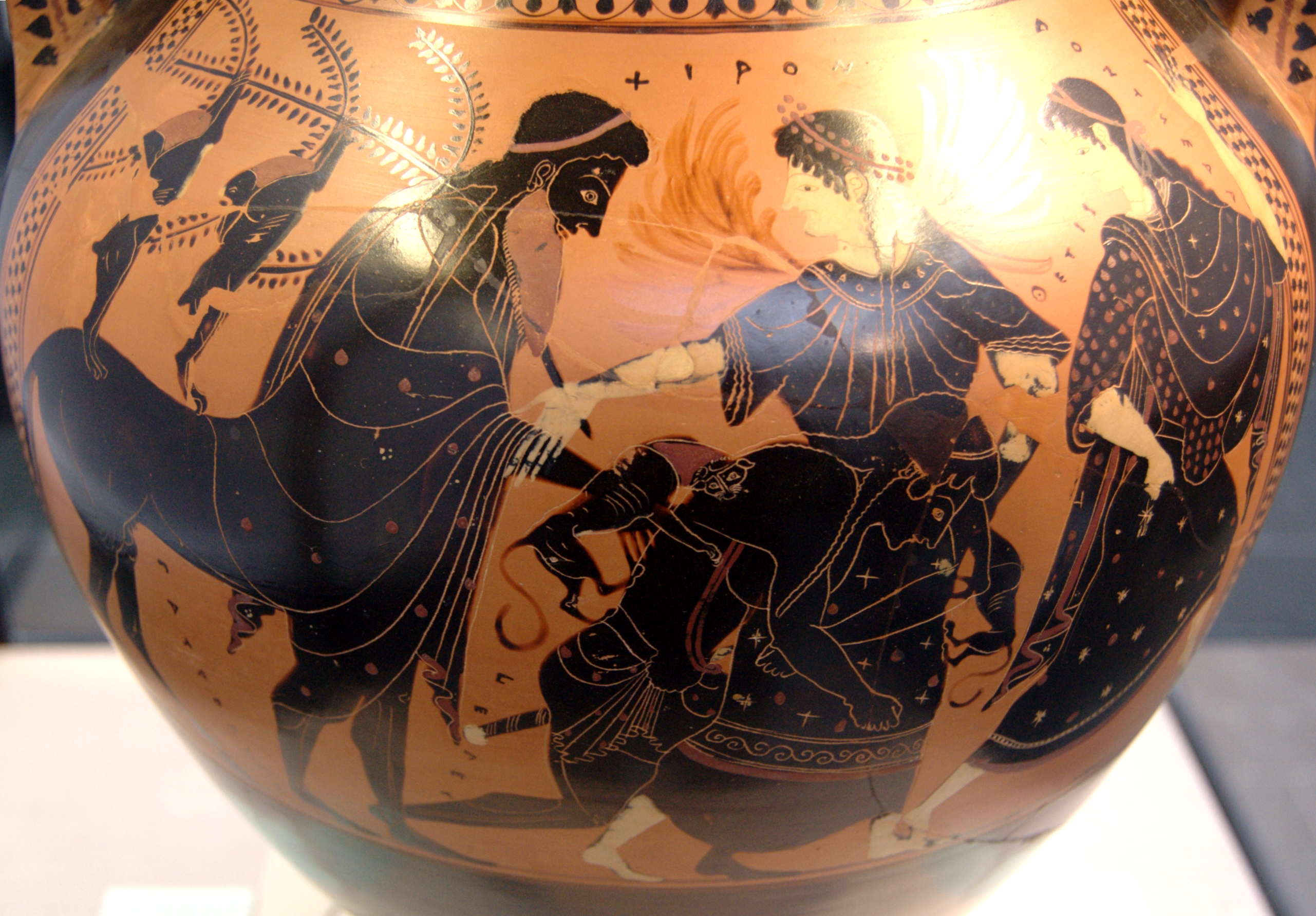|
Argonauts
The Argonauts (; Ancient Greek: ) were a band of heroes in Greek mythology, who in the years before the Trojan War (around 1300 BC) accompanied Jason to Colchis in his quest to find the Golden Fleece. Their name comes from their ship, '' Argo'', named after its builder, Argus. They were sometimes called Minyans, after a prehistoric tribe in the area. Mythology The Golden Fleece After the death of King Cretheus, the Aeolian Pelias usurped the throne from his half-brother Aeson and became king of Iolcus in Thessaly (near the modern city of Volos). Because of this unlawful act, an oracle warned him that a descendant of Aeolus would seek revenge. Pelias put to death every prominent descendant of Aeolus he could, but spared Aeson because of the pleas of their mother Tyro. Instead, Pelias kept Aeson prisoner and forced him to renounce his inheritance. Aeson married Alcimede, who bore him a son named Jason. Pelias intended to kill the baby at once, but Alcimede summoned ... [...More Info...] [...Related Items...] OR: [Wikipedia] [Google] [Baidu] |
Jason
Jason ( ; ) was an ancient Greece, ancient Greek Greek mythology, mythological hero and leader of the Argonauts, whose quest for the Golden Fleece featured in Greek literature. He was the son of Aeson, the rightful king of Iolcos. He was married to the sorceress Medea. He was also the great-grandson of the messenger god Hermes, through his mother's side. Jason appeared in various literary works in the classical world of Ancient Greece, Greece and Ancient Rome, Rome, including the epic poem ''Argonautica'' and the tragedy ''Medea (play), Medea''. In the modern world, Jason has emerged as a character in various adaptations of his myths, such as the 1963 film ''Jason and the Argonauts (1963 film), Jason and the Argonauts'' and the 2000 TV miniseries of the Jason and the Argonauts (TV miniseries), same name. Persecution by Pelias Pelias (Aeson's half-brother) was power-hungry and sought to gain dominion over all of Ancient Thessaly, Thessaly. Pelias was the progeny of a union ... [...More Info...] [...Related Items...] OR: [Wikipedia] [Google] [Baidu] |
Argo
In Greek mythology the ''Argo'' (; in Greek: ) was a ship built with the help of the gods that Jason and the Argonauts sailed from Iolcos to Colchis to retrieve the Golden Fleece. The ship has gone on to be used as a motif in a variety of sources beyond the original legend from books, films and more. Name Most accounts name the ship after her builder, Argus. Cicero suggested that it was named after the " Argives", a term commonly used by Homer for the Greek people of Argos. Diodorus Siculus reported that some thought the name was derived from an ancient Greek word for 'swift', which could have indicated that the ship was designed to move quickly. The adjective, occasionally found, is ''Argoan'' , from Greek ''Ἀργῶος'' through Latin ''Argōus''. Legend Construction of the ''Argo'' The ''Argo'' was constructed by the shipwright Argus, and its crew were specially protected by the goddess Hera. The best source for the myth is the ''Argonautica'' by Apollonius Rh ... [...More Info...] [...Related Items...] OR: [Wikipedia] [Google] [Baidu] |
Argus (son Of Arestor)
In Greek mythology, Argus (; Ancient Greek: Ἄργος ''Argos'') was the builder and eponym of the ship '' Argo'', and consequently one of the Argonauts; he was said to have constructed the ship under Athena's guidance. Argus was commissioned to build the Argo by King Pelias (ruler of Iolcus) so that the crew that would come to be known as the Argonauts could find and bring the Golden Fleece back to Iolcus, which was in Thessaly. Family Argus' parentage is debated, but most often he is referred to be the son of Arestor. The latter was a member of the Argive royal house, is given as his father by Apollonius Rhodius and John Tzetzes, but Hyginus says Argus' parents were Polybus and Argia or Danaus to be his father. Mythology In Valerius Flaccus' ''Argonautica'', Argus is said to have originated from Thespiae. Argus was also credited with creating a wooden statue of Hera that was a cult object in Tiryns. King Pelias did not believe that the crew would be able to come b ... [...More Info...] [...Related Items...] OR: [Wikipedia] [Google] [Baidu] |
Greek Mythology
A major branch of classical mythology, Greek mythology is the body of myths originally told by the ancient Greeks, and a genre of Ancient Greek folklore. These stories concern the origin and nature of the world, the lives and activities of deities, heroes, and mythological creatures, and the origins and significance of the ancient Greeks' own cult and ritual practices. Modern scholars study the myths to shed light on the religious and political institutions of ancient Greece, and to better understand the nature of myth-making itself. The Greek myths were initially propagated in an oral-poetic tradition most likely by Minoan and Mycenaean singers starting in the 18th century BC; eventually the myths of the heroes of the Trojan War and its aftermath became part of the oral tradition of Homer's epic poems, the '' Iliad'' and the '' Odyssey''. Two poems by Homer's near contemporary Hesiod, the '' Theogony'' and the '' Works and Days'', contain accounts of the genes ... [...More Info...] [...Related Items...] OR: [Wikipedia] [Google] [Baidu] |
Colchis
In Greco-Roman geography, Colchis (; ) was an exonym for the Georgian polity of Egrisi ( ka, ეგრისი) located on the coast of the Black Sea, centered in present-day western Georgia. Its population, the Colchians are generally thought to have been an early Kartvelian-speaking tribe ancestral to the contemporary western Georgians, namely Svans and Zans. According to David Marshall Lang: "one of the most important elements in the modern Georgian nation, the Colchians were probably established in the Caucasus by the Middle Bronze Age."''The Cambridge Ancient History'', John Anthony Crook, Elizabeth Rawson, p. 255 It has been described in modern scholarship as "the earliest Georgian formation", which, along with the Kingdom of Iberia, would later contribute significantly to the development of the Kingdom of Georgia and the Georgian nation.Cyril Toumanoff, ''Studies in Christian Caucasian History'', pp. 69, 84Christopher Haas, ''Early Christianity in Contexts, An Explora ... [...More Info...] [...Related Items...] OR: [Wikipedia] [Google] [Baidu] |
Volos
Volos ( el, Βόλος ) is a coastal port city in Thessaly situated midway on the Greek mainland, about north of Athens and south of Thessaloniki. It is the sixth most populous city of Greece, and the capital of the Magnesia regional unit of the Thessaly Region. Volos is also the only outlet to the sea from Thessaly, the country's largest agricultural region. With a population of 144,449 (2011), the city is an important industrial centre, and its port provides a bridge between Europe and Asia. Volos is the newest of the Greek port cities, with a large proportion of modern buildings erected following catastrophic earthquakes in 1955. It includes the municipal units of Volos, Nea Ionia and Iolkos, as well as smaller suburban communities. The economy of the city is based on manufacturing, trade, services and tourism. Home to the University of Thessaly, the city also offers facilities for conferences, exhibitions and major sporting, cultural and scientific events. Volos par ... [...More Info...] [...Related Items...] OR: [Wikipedia] [Google] [Baidu] |
Golden Fleece
In Greek mythology, the Golden Fleece ( el, Χρυσόμαλλον δέρας, ''Chrysómallon déras'') is the fleece of the golden-woolled,, ''Khrusómallos''. winged ram, Chrysomallos, that rescued Phrixus and brought him to Colchis, where Phrixus then sacrificed it to Zeus. Phrixus gave the fleece to King Aeëtes who kept it in a sacred grove, whence Jason and the Argonauts stole it with the help of Medea, Aeëtes' daughter. The fleece is a symbol of authority and kingship. In the historical account, the hero Jason and his crew of Argonauts set out on a quest for the fleece by order of King Pelias in order to place Jason rightfully on the throne of Iolcus in Thessaly. Through the help of Medea, they acquire the Golden Fleece. The story is of great antiquity and was current in the time of Homer (eighth century BC). It survives in various forms, among which the details vary. Nowadays, the heraldic variations of the Golden Fleece are featured frequently in Georgi ... [...More Info...] [...Related Items...] OR: [Wikipedia] [Google] [Baidu] |
Poseidon
Poseidon (; grc-gre, Ποσειδῶν) was one of the Twelve Olympians in ancient Greek religion and myth, god of the sea, storms, earthquakes and horses.Burkert 1985pp. 136–139 In pre-Olympian Bronze Age Greece, he was venerated as a chief deity at Pylos and Thebes. He also had the cult title "earth shaker". In the myths of isolated Arcadia he is related with Demeter and Persephone and he was venerated as a horse, however, it seems that he was originally a god of the waters.Seneca quaest. Nat. VI 6 :Nilsson Vol I p.450 He is often regarded as the tamer or father of horses, and with a strike of his trident, he created springs which are related to the word horse.Nilsson Vol I p.450 His Roman equivalent is Neptune. Poseidon was the protector of seafarers, and of many Hellenic cities and colonies. Homer and Hesiod suggest that Poseidon became lord of the sea when, following the overthrow of his father Cronus, the world was divided by lot among Cronus' three sons; Zeus was ... [...More Info...] [...Related Items...] OR: [Wikipedia] [Google] [Baidu] |
Chiron
In Greek mythology, Chiron ( ; also Cheiron or Kheiron; ) was held to be the superlative centaur amongst his brethren since he was called the "wisest and justest of all the centaurs". Biography Chiron was notable throughout Greek mythology for his youth-nurturing nature. His personal skills tend to match those of his foster father Apollo, who taught the young centaur the art of medicine, herbs, music, archery, hunting, gymnastics and prophecy, and made him rise above his beastly nature. Chiron was known for his knowledge and skill with medicine, and thus was credited with the discovery of botany and pharmacy, the science of herbs and medicine. Pliny the Elder, '' Naturalis Historia'7.56.3/ref> Like satyrs, centaurs were notorious for being wild, lusty, overly indulgent drinkers and carousers, violent when intoxicated, and generally uncultured delinquents. Chiron, by contrast, was intelligent, civilized and kind, because he was not related directly to the other centaurs du ... [...More Info...] [...Related Items...] OR: [Wikipedia] [Google] [Baidu] |
Pelias
Pelias ( ; Ancient Greek: Πελίας) was king of Iolcus in Greek mythology. He was the one who sent Jason on the quest for the Golden Fleece. Family Pelias was the son of Tyro and Poseidon. His wife is recorded as either Anaxibia, daughter of Bias, or Phylomache, daughter of Amphion. He was the father of Acastus, Pisidice, Alcestis, Pelopia, Hippothoe, Amphinome, Evadne, Asteropeia, Antinoe and Medusa. These daughters are sometimes called collectively as Peliades after their father. Mythology Early years Tyro was married to King Cretheus of Iolcus, with whom she had three sons, Aeson, Pherês, and Amythaon, but she loved Enipeus, a river god. She pursued Enipeus, who refused her advances. One day, Poseidon, filled with lust for Tyro, disguised himself as Enipeus and lay with her; from their union were born twin sons, Pelias and Neleus. Tyro exposed her sons on a mountain to die, but they were found by a herdsman who raised them as his own, as one story goes, o ... [...More Info...] [...Related Items...] OR: [Wikipedia] [Google] [Baidu] |
Phrixus
In Greek mythology Phrixus (; also spelt Phryxus; el, Φρίξος, ''Phrixos'' means "standing on end, bristling") was the son of Athamas, king of Boeotia, and Nephele (a goddess of clouds). He was the twin brother of Helle and the father of Argus, Phrontis, Melas and Cytisorus by Chalciope ( Iophassa), daughter of Aeetes, king of Colchis. Mythology Phrixus and Helle (also known as Ellie) were hated by their stepmother, Ino. She hatched a devious plot to get rid of the twins, roasting all of Boeotia's crop seeds so they would not grow. The local farmers, frightened of famine, asked a nearby oracle for assistance. Ino bribed the men sent to the oracle to lie and tell the others that the oracle required the sacrifice of Phrixus and Helle. Before they were killed, though, Phrixus and Helle were rescued by a flying, or swimming, ram with golden wool sent by Nephele, their natural mother; their starting point is variously recorded as Halos in Thessaly and Orchomenus in B ... [...More Info...] [...Related Items...] OR: [Wikipedia] [Google] [Baidu] |










